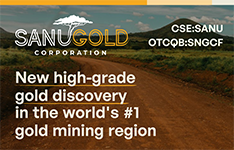There's something "odd" showing up on the shelves of 22 locations of the Calgary Co-op, which has been serving fresh farm-to-table foods to Calgarians since 1956. Odd Burger recently announced that it has added Calgary Co-op as a retailer for its consumer-packaged goods (CPG) line, where all five frozen products are now available for sale.
The five products include the Crispy ChickUn Fillet, Chickpea Burger, Smash Burger, ChickUn Pretenders, and Breakfast Sausage. All are products of a Canadian franchised vegan fast food restaurant chain and food technology company called Odd Burger Corp. (ODD:TSX.V; ODDAF:OTC; IA9:FRA).
The "odd" stands for doing things differently, according to James McInnes, the co-founder, chief executive officer and chairman of the board for the company.
"We're going to create change in the world," McInnes told Streetwise Reports. "The idea that something is odd doesn't mean it's bad or good; it just means it's fundamentally different, and we need to think differently to feed the world in the future."
The company's proprietary line of plant-based protein and dairy alternatives are distributed to Odd Burger restaurant locations through its foodservice line and also sold at grocery retailers through its CPG line.
Odd Burger restaurants operate as smart kitchens, which use state-of-the art cooking technology and automation solutions "customers craving healthier and more sustainable fast food," the company said.
Stores have small footprints optimized for delivery and takeout, advanced cooking technology, competitive pricing, a vertically integrated supply chain, and healthier ingredients, "creating guilt-free fast food," the company said.
"We are proud to support a Canadian-owned and operated business like Odd Burger," Calgary Co-op Meat Category Director James Lelonde said. "We see tremendous potential for the Odd Burger line with our customers, and we are thrilled to make them available at our retail locations."
'Huge Opportunity' for Tasty Technology
Odd Burger has 20 operational units in four provinces, including six corporate-owned restaurants, 12 franchised restaurants, and two franchised mobile units, producing an average annual revenue per restaurant of nearly CA$500,000. The company notes that its average sales per restaurant at locations in the West Coast of Canada are closer to CA$1,000,000 per unit annualized, with demographics in the West better matching the Odd Burger product offering. The company said it has 136 locations in the pipeline through signed franchise agreements in Canada and the United States and expects its first US location to open in Q4 of 2025.
Odd Burger manufactures its food at its own manufacturing facility in London, Ontario, using primarily whole food, plant-based ingredients including chickpeas, wheat, oats, and beans. The company said it produces 11 plant-based proteins and eight dairy-free sauces and dressing "that pair with restaurant cooking technology." It also recently launched plant-based pizza at its Canadian restaurants, including one called "Plant-Meat Lovers," highlighting the diversity of product offerings possible at Odd Burger.
The company's frozen retail line is currently listed in more than 60 retailers, including Whole Foods Market, Goodness Me, Sobeys, and now Calgary Coop Odd Burger said. The Company confirms that it plans to greatly expand the distribution of its CPG line in 2025 as part of its strategic initiatives to drive profitable growth.
Disrupting Decades-Old Industry
The company said it reported revenue of CA$3.1 million in FY 2024, which ended last September 30 and saw a gross profit margin of 34%, its highest since reporting as a public company. Odd Burger also narrowed its loss from CA$0.051 per share in FY 2023 to CA$0.023 in FY 2024, indicating that the company may soon become profitable if this trend continues.
Fundamentally, Odd Burger is a technology company operating in the fast-food space and plans to continue to invest and develop its technology at both its restaurant locations and at its manufacturing plant.
Odd Burger restaurant locations are highly automated and can currently operate with as little as one staff member.
"The fast-food industry has been doing things the same way for the past 50 years," he said. "So, we are changing not only the food but also the technology that is utilized at the restaurants."
Its cooking technology is also more sustainable since it features "on-demand cooking" capable of cooking a burger patty in about one minute, instead of traditional open-flame cooking methods used at other fast-food chains, which are far less efficient.
The company also has a stated goal on its investor presentation to build "the first fully automated and sustainable restaurant of the future, which McInnes said would leave more time for "people connecting with people, instead of just flipping burgers and will drive additional profitability through increased efficiencies."
McInnes goes on to say that it's also closely looking at the cultivated food industry to bring "real meat and dairy" without the use of animals into its restaurant locations, making these products still vegan. "This technology is in the early stages but is showing incredible promise," McInnes said, "and no one has really done a good job at commercializing (these products) yet. There's a huge opportunity for giving consumers animal protein that doesn't use animals, and these products will be much better in terms of sustainability, health, and, of course, the impact on animals. The key is to now figure out how to scale the technology and commercialize it at a price point that makes sense for the consumer."
More People Adopting Vegan Lifestyles
According to a report by Grand View Research, the global market size for meat substitutes was valued at US$18.78 billion in 2023 and is expected to grow at a large compound annual growth rate (CAGR) of 42.4% from 2024 to 2030.
"Diets that reduce or eliminate animal products are gaining popularity, which is expected to fuel the growth of the market," the report said. "More people are adopting vegan lifestyles, driven by increased awareness of the health risks associated with meat consumption, as well as concerns about the ethical and environmental impacts of animal agriculture."
Grand View said a 2023 study by Soylent found that 68.1% of those who choose veganism are motivated by animal welfare, 17.4% by health reasons, and 9.7% by environmental and sustainability concerns.
Additionally, the fear of increasing animal-borne diseases has heightened health concerns, leading to a decline in animal product consumption. As awareness of meat substitutes grows, more consumers are turning to these alternatives, recognizing their potential health benefits, including the prevention of non-communicable diseases, digestive issues, and obesity.
"Intensive animal farming has faced criticism due to its environmental impact and ethical concerns, leading companies to offer meat substitutes" like Odd Burger's products, the report said.
"The substantial growth in the meat alternatives market is fueled by a combination of consumer concerns and manufacturers' ability to create products with superior texture, flavor, and mouthfeel," Grand View noted. "This demand is particularly driven by Gen Z and Millennials, who are motivated by concerns about health, climate change, and animal welfare."
According to Grand View, "The rising demand for plant-based alternatives, coupled with significant investments in innovative products, is expected to continue creating profitable opportunities for market expansion."
Craving is for 'Protein, Good Fat, Salt'
Popular meat substitute brands the company is competing with include MorningStar Farms, Beyond Meat, and Impossible. Fast food restaurants like KFC, Burger King, and Taco Bell have limited plant-based options, such as Burger King's Impossible Whopper.
Global meat consumption is expected to see double-digit growth through 2023, according to the Organization for Economic Co-operation and Development.
On a Euronews Business podcast on January 29, Tom Goodwin talked to Lukas Böni, co-founder of the company Planted, specializing in meat alternative products. Some, like Böni, believe the tide will turn in favor of vegan alternatives.
"In some years from now, our steaks are going to be better in taste and quality . . . The Sunday roast will not be an animal roast, but a Planted roast," Böni told Euronews.
The plant-based products market will grow due to environmental necessities and the availability of tasty, quality alternatives to meat products, he said.
"Meat has a craving, but your craving is not for dead animals; it is for protein, good fat, and salt," he said. "So, in the future, microbes will cater for your cravings."
 Streetwise Ownership Overview*
Streetwise Ownership Overview*
Odd Burger Corp. (ODD:TSX; ODDAF:OTC; IA9:FRA)
Analyst Devin Schilling of Ventum Capital Markets noted while initiating coverage of a comparable company, Happy Belly Food Group Inc., that there is "a void in the marketplace" for consolidating emerging food brands in the QSR (quick-service restaurant) industry. The company's stock has nearly doubled since last fall.
"The company's focus is on acquiring and scaling emerging food brands, enabling it to capitalize on evolving consumer preferences," Schilling wrote on December 17, 2024. "This strategic focus allows Happy Belly to tap into niche markets with significant growth potential."
Ownership and Share Structure
According to Odd Burger, about 62% of the company is owned by insiders, and in addition,10% of shareholders are close to management, while less than 1% is owned by institutions. The rest is retail.
Top shareholders include co-founders James and Vasiliki McInnes, who both hold 23.74%, BoxOne Ventures Inc. with 14.2%, board member Francois Arbor with 2.23%, and board member Utsang Desai with 0.37%, Reuters reported.
The company said it has 98.4 million shares outstanding. Its market cap is CA$30.46 million and has traded in a 52-week range between CA$0.11 and CA$0.38.
| Want to be the first to know about interesting Special Situations investment ideas? Sign up to receive the FREE Streetwise Reports' newsletter. | Subscribe |
Important Disclosures:
- Odd Burger Corp. has a consulting relationship with Street Smart an affiliate of Streetwise Reports. Street Smart Clients pay a monthly consulting fee between US$8,000 and US$20,000.
- Steve Sobek wrote this article for Streetwise Reports LLC and provides services to Streetwise Reports as an employee.
- This article does not constitute investment advice and is not a solicitation for any investment. Streetwise Reports does not render general or specific investment advice and the information on Streetwise Reports should not be considered a recommendation to buy or sell any security. Each reader is encouraged to consult with his or her personal financial adviser and perform their own comprehensive investment research. By opening this page, each reader accepts and agrees to Streetwise Reports' terms of use and full legal disclaimer. Streetwise Reports does not endorse or recommend the business, products, services or securities of any company.
For additional disclosures, please click here.










































